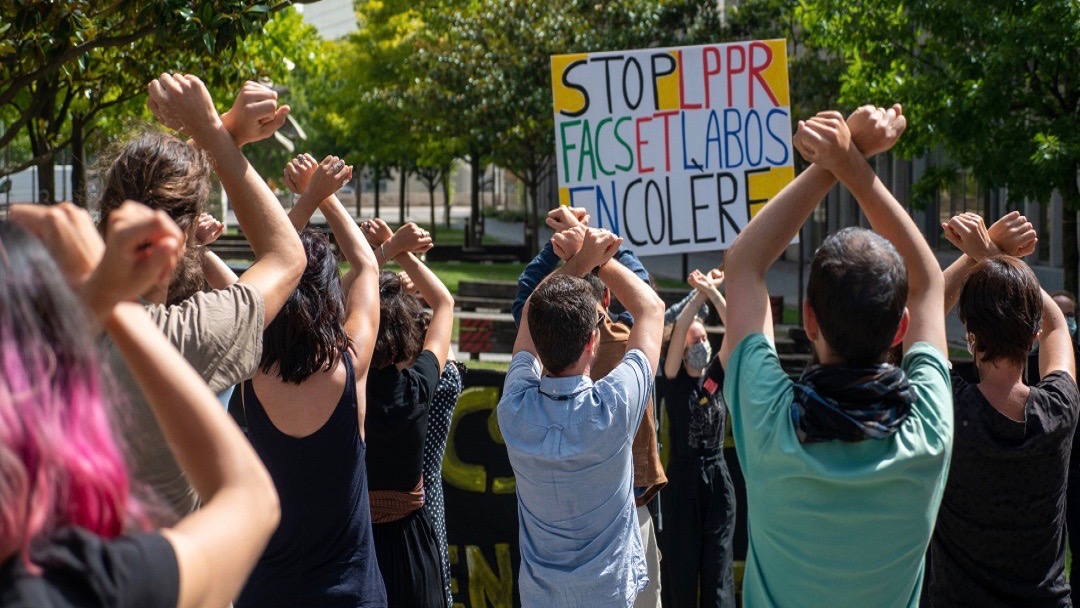On July 8, Wednesday, the research community in France under the leadership of Faculties and Labs in Struggle protested against the controversial LPPR (Pluriannual Research Programming Law) bill and the ‘Welcome to France’ program introduced by the government with the aim to privatize and commercialize higher education and research institutes in France. Protests took place in Paris, Lyon, Nice, and Montpellier on Wednesday. Activists from Inter-hospital Collective, National Union of Students of France(UNEF), Fédération Syndicale Unitaire (FSU) and the General Confederation of Labor (CGT) joined the protests in Paris. The Union of Communist Students (UEC) also organized an online campaign against the LPPR on Wednesday.
The LPPR bill was conceptualized by the Emmanuel Macron-led government by the end of 2019, with the official aim of planning the budget for research institutes and universities in France. This bill intends to increase competition for grants between research teams, and to get rid of the legal framework guaranteeing job stability and stipulating teaching hours. It also calls for converting permanent researcher posts to contract vacancies based on the tenure of research projects. So far, university teachers and researchers in France have held a public servant status.
According to reports, the Minister of Higher Education, Research and Innovation, Frédérique Vidal, wants to rush through the formalities in order to get the bill passed at the earliest. The LPPR was examined by the National Council for Higher Education and Research (CNESER) in June, and was presented to the council of ministers on July 8. The date of the parliamentary vote is not yet fixed.
‘Welcome to France’ is a plan initiated by the French government in 2018 to streamline the flow of foreign students to French universities. The program has been denounced by progressive sections as a tool to offer admission to affluent foreign students and deny access to students from poorer backgrounds. In the name of promoting internationalism, this project envisages partnerships between elite French and African universities and setting up French-speaking universities abroad, especially in the African countries. This will be to the detriment of local universities and strengthen the hegemony of French Universities over the local institutions.
Critics have said that this would lead to to the altering of education and university models in Africa in favor of the commercial logic. Students from the poorer sections in these countries are also likely to be excluded from the Francophone universities due to the high fees and other requirements.
Towards the mobilization on Wednesday, Faculties and Labs in Struggle stated the government was moving towards more casualization. It said that this approach would be extremely dangerous in situations like the current COVID-19 pandemic.
The Union of Communist Students (UEC) said, “to build the world of tomorrow you need to invest in public research and upgrade the work of researchers. The state should not divest from research as the current French government does”.
Anais Fley, the National Secretary of the UEC, told Peoples Dispatch that the model of academic development sought to be imposed in Africa by ‘Welcome to France’ is in the interest of the French and African bourgeoisie. “On the one hand, the government excludes students from French universities by massively increasing registration fees. On the other hand, Francophone universities are located abroad at the expense of local universities. By strengthening the dependence of the universities of African countries and excluding a large part of its youth from university, France highlights the limits of a neoliberal development model of education based on injustice and exploitation,” she said.
She added that it is essential to build a new international and democratic academic cooperation system. “It is with this objective that we, French students, are fighting for scientific progress and for the freedom of peoples. We are mobilized for the free welcome of all students in France. To study is to work, whether we are French or not”, she added.
Faculties and Labs in Struggle has been organizing strong protests against the bill since the beginning of 2020. On March 5, tens of thousands of researchers had joined mobilizations against the LPPR across the country, with over 20,000 people participating in Paris alone. More than 100 universities and schools, and nearly 300 laboratories and 145 scientific journals in the humanities and social sciences are affiliated to the National Coordination of Faculties and Labs in Struggle which has been leading the struggle against the LPPR.
Since his inauguration as the president of France in May 2017, Macron has been pursuing EU-driven neoliberal policies promoting privatization and austerity, which have produced devastating effects in every sphere of life across France. His government’s policies in the field of education, including the Baccalaureate reforms, the Orientation et Réussite des Étudiants (ORE) law, etc., have also drawn widespread criticism and protests.





